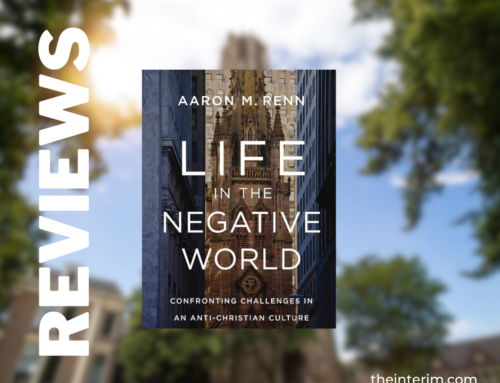 It is not surprising that, in his first encyclical, promulgated on Jan. 25, Pope Benedict XVI examines the relationship between church and state, the meaning of human sexuality and the obligations and prerogatives of Christian life. What is surprising is that he does this only through his reflections on love, the overarching theme of his letter. But if it seems odd that such disparate elements can be united by one theme – and, of all things, love – then the first lesson of the encyclical is to broaden our impoverished conception of love. To recover the full richness of the word, the Pope not only confronts such thinkers as Nietzsche and Marx, but also returns to ancient philosophy and sacred Scripture to rejuvenate our understanding.
It is not surprising that, in his first encyclical, promulgated on Jan. 25, Pope Benedict XVI examines the relationship between church and state, the meaning of human sexuality and the obligations and prerogatives of Christian life. What is surprising is that he does this only through his reflections on love, the overarching theme of his letter. But if it seems odd that such disparate elements can be united by one theme – and, of all things, love – then the first lesson of the encyclical is to broaden our impoverished conception of love. To recover the full richness of the word, the Pope not only confronts such thinkers as Nietzsche and Marx, but also returns to ancient philosophy and sacred Scripture to rejuvenate our understanding.
Beginning with the concept of eros, Benedict shows that Christian virtues do not limit human love, “they heal it and restore its true grandeur.” In introducing this work to readers of the Italian magazine Famiglia Cristiana, the Pope writes: “I have tried to show in the encyclical that the most profound promise of ‘eros’ can mature only when we do not seek transitory and sudden happiness alone.”
When “the other’s happiness is more important than our own,” says Benedict, “we no longer want to receive something, but give ourselves and in this liberation from his “I,” man finds himself and is filled with joy.” This dignified and exultant vision of human love shames the modern understanding of human sexuality, which reduces persons to objects and which reduces sex to something “enjoyable and harmless” – and, therefore, meaningless. “True eros,” on the other hand, “tends to rise ‘in ecstasy’ towards the divine, to lead us beyond ourselves. Yet, for this very reason, it calls for a path of ascent, renunciation, purification and healing.”
Thus, Christian virtues allow eros to recover its full potential and its true meaning. In the aforementioned magazine article, Benedict writes: “The language of the tradition of the church has called this process ‘education in chastity,’ which, in the end, means nothing other than to learn the totality of love in the patience of growth and maturation.”
This “inward purification” allows the infinite and eternal promises of “love to become definitive … in the sense of exclusivity (this particular person alone) and in the sense of being ‘for ever.’” And here, Benedict beautifully observes that in true eros there is an image of divine love, corresponding “to the image of a monotheistic God is monogamous marriage. Marriage based on exclusive and definitive love becomes the icon of the relationship between God and his people and vice versa.”
The rich nuptial images of the Old Testament, however, become consummated when the Word is made flesh: the “real novelty of the New Testament lies not so much in new ideas as in the figure of Christ himself, who gives flesh and blood to those concepts – an unprecedented realism.” The centerpiece of the first part of the encyclical is a meditation on the example of love, given by God himself in Christ.
The example of Christ is not merely the fulfillment of God’s self-manifestation in history, it is the program of Christian life. Thus, in the second section of the encyclical, Pope Benedict examines the political dimensions of the love of neighbour.
This duty to love inevitably thrusts the church into an active and public role. But the public mission of the church does not jeopardize its identity – as Benedict notes in his introductory letter, by “her very nature, the church does not engage in politics in the first person; rather, she respects the autonomy of the state and of its institutions.”
But the formula that reminds the faithful about the limits of the role of the church also re-establishes the limits of the state. Indeed, there “is no ordering of the state so just that it can eliminate the need for a service of love.” Furthermore, the church has a vital insight to offer: “it is the task of the church to cure reason and reinforce the will to do good. In this connection, without engaging in politics, the church participates passionately in the battle for justice.”
The modern state pretends it can do without love because it invokes the concept of “human rights” as a source of purely secular dignity. But this does not take the needs of the soul seriously: the “state which would provide everything, absorbing everything into itself,” is nonetheless “incapable of guaranteeing the very thing which the suffering person – every person – needs: namely, loving personal concern.”
The anemic language of human rights does not fully address the problem or provide the solution because, even when justice is met, the soul still needs love. The French philosopher Simone Weil put it pointedly: “One cannot imagine St. Francis of Assisi talking about rights.” Thus, the encyclical concludes with a catalogue of saints who have been exemplars of Christian charity – among them Blessed Teresa of Calcutta, Francis of Assisi, Vincent de Paul, John Bosco and of course, Mary, the Mother of the Lord.
Although the letter is at times difficult and theoretical, the pontiff’s brilliant intellect is rivalled only by pastoral instincts, and he is always as direct as possible. For his intended audience, there is no difficulty.
For people who have only read about the Pope in the popular press, however, the encyclical will seem very strange, indeed. To those who have accepted the media’s interpretation of Cardinal Ratzinger – that he is a doctrinaire reactionary – this encyclical may seem to be a complete departure. But, as his longtime friend, Fr. Joseph Fessio, remarked: “to those who have read his works, are familiar with his life or have had the privilege of knowing him, the encyclical is no surprise … He has a sense of the poetry of life and of revelation, which gives his writing clarity, depth and beauty.”
The encyclical itself incorporates many of the insights and influences of the Pope’s late friends and colleagues Hans Urs von Balthasar and Luigi Giussani. But the most important influence, of course, is his beloved predecessor.
On Jan. 1, 2004, in one of his last letters, Pope John Paul II concluded his “Message for the World Day of Peace 2004” with an impassioned call to Christians to build a “civilization of love.” A year later, his successor and close friend Benedict XVI, issues his first encyclical, responding to that call, building on his legacy, and, most of all, reminding both the church and the world that love is the history, the dignity, and the destiny of man.
Stephen Tardiff is studying literature and philosophy at St. Michael’s College at the University of Toronto.




